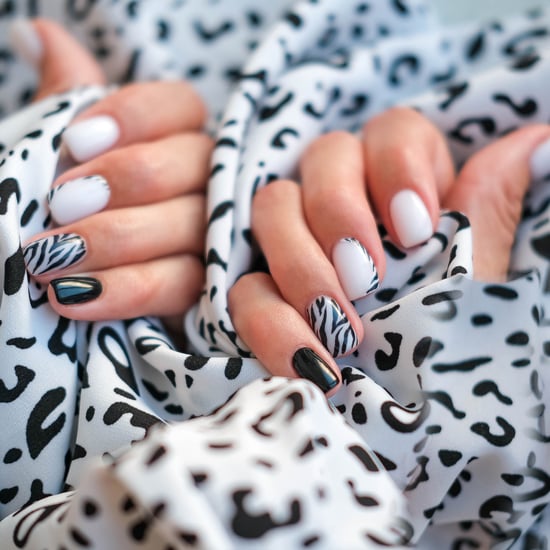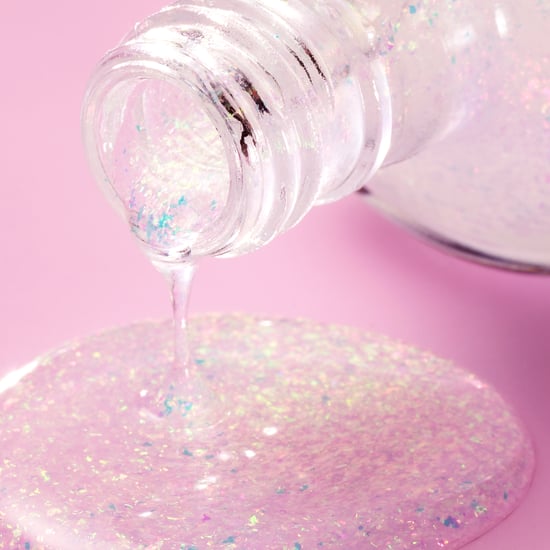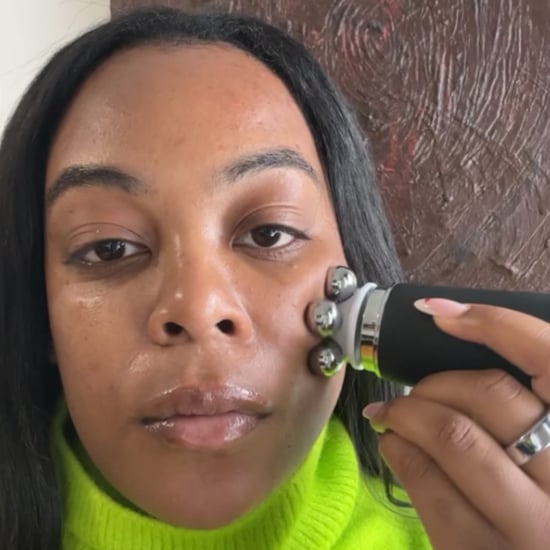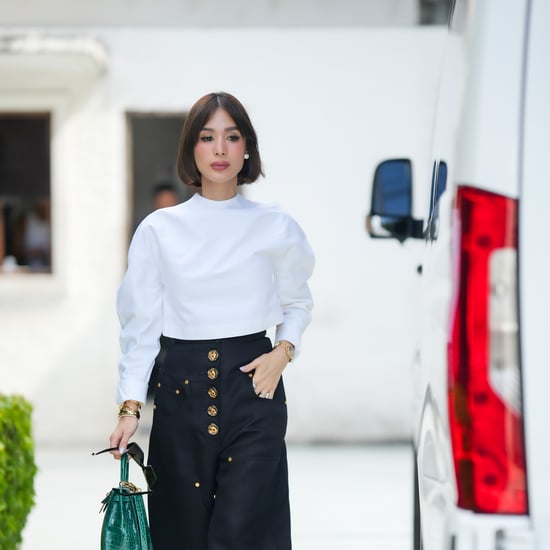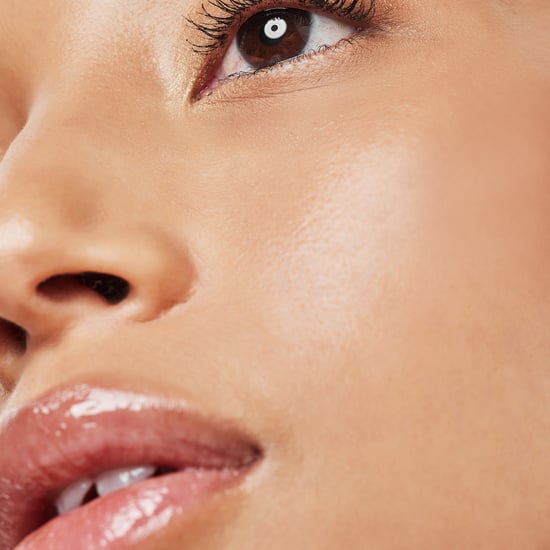A Guide to Sustainable Beauty: What Each Buzzword Means
Sustainable Beauty Is a Confusing Game — Here's a Guide to the Terms You Need to Know
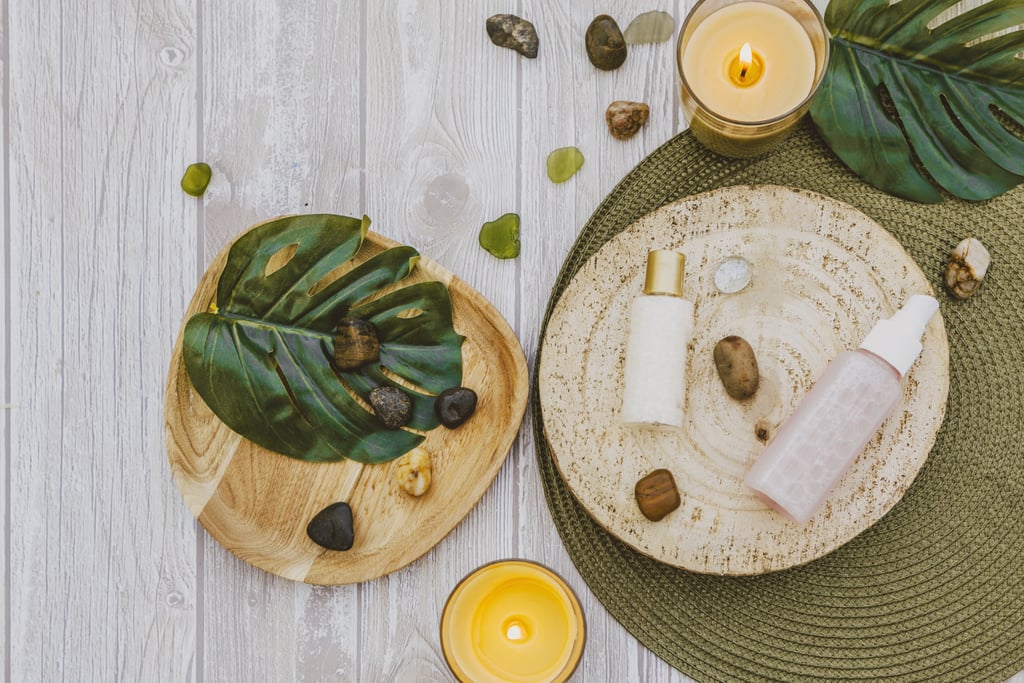
Beauty consumers are becoming increasingly aware of the ingredients in some of their go-to products, as well as the effects said products and packaging might have on the environment. Over the last few years, terms under the sustainable beauty umbrella like "zero waste," "waterless," "clean," "vegan," and "eco-friendly" have been used to describe tons of beauty products, but because the Food and Drug Administration doesn't regulate them in the context of cosmetics labelling or ingredients, it can be hard to understand what each one means.
Now, as experts make greater attempts to stop the spread of misinformation (and as more of the aforementioned terms are written off as being fear-mongering marketing jargon), the world of sustainable beauty has gained a reputation for being quite complicated and difficult to decipher. To cut through all the noise, we've put together a breakdown of the most commonly used buzzwords and phrases in the world of sustainable beauty. Check out what they all mean ahead.
"Waterless" Beauty
Waterless beauty products are exactly what they sound like: formulas that don't include water. There are a handful of reasons a brand may choose to release a product free of this valuable resource, a major one being that it helps minimise the use of plastic packaging (of which there's something like 42.1 billion bottles used to ship products of mostly water).
According to a Whole Foods trend report from earlier this year, "When a product isn't in liquid form, brands can use materials such as recyclable boxes or metal tins, and the product is generally smaller, reducing the amount of packaging needed and the shipping weight. Expect to see shampoo and conditioner bars that leave hair fresh and clean with less packaging, and toothpaste tablets that whiten, brush away plaque and do some good for the environment."
To add to that, products that only feature key ingredients are often more efficacious. "Most skin-care formulas are roughly 70 to 80 percent water, so if you remove the water, then you are left with mainly your active ingredients, which are going to have a greater impact on your skin," Shea Amiruddin, Heyday's director of skin education, previously told POPSUGAR. "This also means less filler [ingredients] and sometimes even preservatives so your products are just full of the good stuff that will change and treat your skin."
"Zero-Waste" Beauty
According to Ashlene Nand of Vaycay Beauty, zero waste can be defined in a handful of ways. "Generally, what I look for as a consumer and beauty founder are products that aren't contributing to our landfill crisis," she told POPSUGAR. "The less waste you have to throw out, the better. Aside from cardboard, which is generally compostable and biodegradable, many zero-waste beauty products use reusable tins or glass mason jars to hold the actual product instead of plastic."
As stated in a report from Zero Waste Week, the beauty industry alone produces over 120 billion units of packaging a year, which makes the idea of switching to a zero-waste routine sound slightly intimidating. Most people might think this would call for a complete overhaul of your beauty routine, but even the smallest changes can make a difference. "Similar to the approach of eating one vegan meal a day, if we try to switch out two or more of our core products, collectively, we can make a difference to our planet," Nand said.
Additionally, a handful of companies have popped up in recent years with zero-waste missions and others that offer incentives for customers to recycle and drop off empty packaging.
"Upcycled" or "Circular" Beauty
Brands are now beginning to repurpose would-be food waste into skin-care products. According to an earlier trend report from Whole Foods, this includes items like "coffee grounds, discarded apricot stones, leftover argan shells," and other foods that might otherwise get discarded after using but are instead being upcycled, making their way into beauty products to avoid waste. Similarly, this term can also refer to packaging that gets recycled to become a new beauty product (either from the same brand or otherwise), which brings the use of plastic "full circle."
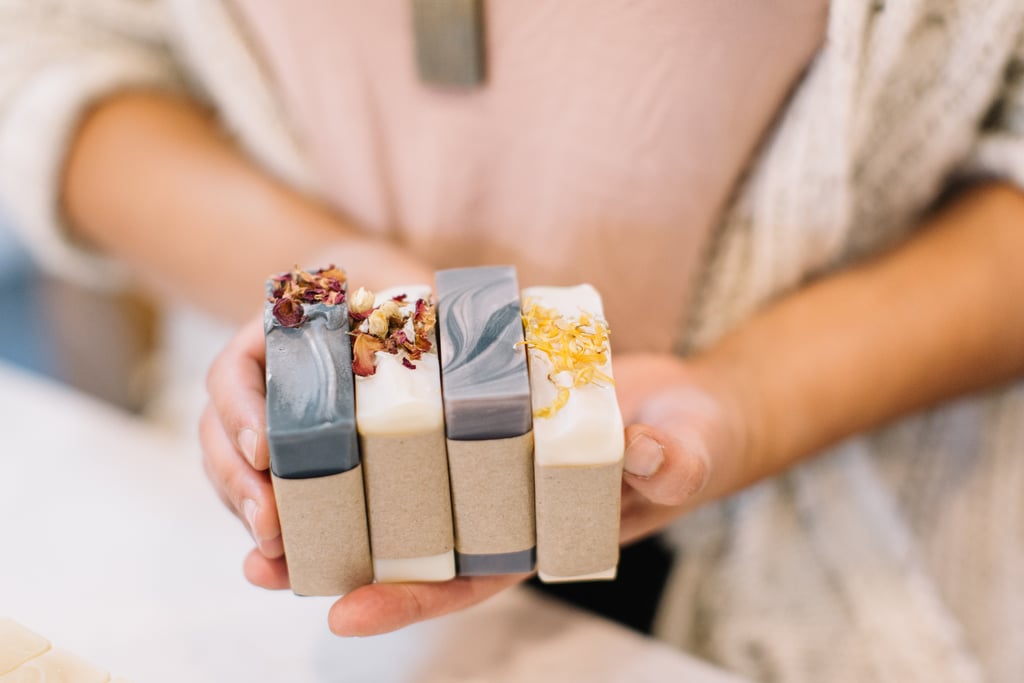
!["Clean" Beauty
Clean beauty may be the most commonly misunderstood term of the bunch, so let's start here. In 2010, the David Suzuki Foundation released a list of ingredients now referred to as the "dirty dozen," or 12 common chemicals found in cosmetics that are potentially harmful to the health of consumers. This list in mind, a clean beauty product is one that's formulated without controversial ingredients like phthalates, parabens, oxybenzone, aluminium, some fragrances, and more. However, because there's little regulation from the Food and Drug Administration in terms of what can be labeled "clean" and what can't, any brand can slap a clean label on their products for the sake of marketing.
"There is no official definition for 'clean' as it pertains to [beauty] products, and different companies may use it referring to different things," dermatologist Francesca Fusco, MD, previously told POPSUGAR. "When I ask companies to explain, I get responses like that a product is vegan, organic, natural, or has no chemicals, preservatives, is 'ethical' with minimal waste, or ingredients that are on the warning list with the Environmental Working Group that would be glass and not plastic."
Despite the lack of official definition, the market around "clean" beauty products is booming — and expected to be worth $22 billion by 2024.
"Vegan" Beauty
In the same way that vegan foods don't contain any animal byproduct, vegan beauty products don't contain animal-based ingredients such as beeswax, lanolin, milk, and honey. Determining whether or not a product is vegan can be slightly tricky though, considering the label on the back of a product isn't always going to point out whether a specific ingredient is animal-derived. (For example, you'd only know that a product containing lanolin isn't vegan if you were already aware that lanolin is derived from sheep wool, not because the label tells you that.)
These days though, many brands make it clear whether or not its products are vegan, and there are certifications from groups like PETA and the Vegan Society that help validate these claims. That goes for fan-favourite brands like KVD Vegan Beauty, The Lip Bar, E.l.f. Cosmetics, and more.
"Blue" Beauty
Blue beauty is a movement that was spearheaded by Beauty Heroes founder Jeannie Jarnot in an effort to preserve oceans, since wasteful, non-recyclable packaging can eventually end up in the ocean after being discarded, destroying and/or harming the underwater habitats and the animals that inhabit them.
"Blue beauty specifically supports ocean conservation, using reef safe ingredients and moving towards zero-waste packaging, or packaging that is virtually plastic free," Jillian Wright, founder of the Indie Beauty Expo, previously told POPSUGAR.
In an effort to decrease the amount of plastic that ends up in the ocean, more brands have begun producing items featuring sustainable packaging.
"Organic" Beauty
In terms of food, organic typically means that a product was farmed without the use of chemicals or pesticides, but according to the United States Department of Agriculture (USDA) website, the "FDA does not define or regulate the term 'organic,' as it applies to cosmetics, body care, or personal care products." Still, a beauty product can carry an organic seal if at least 70 percent of its ingredients are organic.
"Natural" Beauty
Natural products usually feature ingredients that are naturally-derived, but it's important to remember that a product being made of natural ingredients doesn't always make it safer than those that aren't.
"Calling a beauty product natural legally means nothing," Dr. Ebru Karpuzoglu, MSc., PhD, and founder of natural skin-care brand AveSeena, told POPSUGAR. "It's an unregulated term because the FDA, USDA, or EU do not have any regulations or standards on the term. Since there is no regulation on the 'natural' term, anyone can just use one or two natural ingredients in a product and call it natural. If you see the natural ingredients only at the end of the product's ingredient list, that means it's hardly natural."
"Cruelty-Free" Beauty
You might think vegan and cruelty free are the same, but that's not the case. Cruelty-free brands are those that don't test their products and ingredients on animals. You can usually tell if a product hasn't been tested on animals if it features a rabbit symbol on the label, aka the Leaping Bunny certification. Garnier is the latest major beauty brand to officially commit to being cruelty-free, following in the earlier footsteps of CoverGirl, who received a Leaping Bunny seal back in 2018. "Clean" Beauty
Clean beauty may be the most commonly misunderstood term of the bunch, so let's start here. In 2010, the David Suzuki Foundation released a list of ingredients now referred to as the "dirty dozen," or 12 common chemicals found in cosmetics that are potentially harmful to the health of consumers. This list in mind, a clean beauty product is one that's formulated without controversial ingredients like phthalates, parabens, oxybenzone, aluminium, some fragrances, and more. However, because there's little regulation from the Food and Drug Administration in terms of what can be labeled "clean" and what can't, any brand can slap a clean label on their products for the sake of marketing.
"There is no official definition for 'clean' as it pertains to [beauty] products, and different companies may use it referring to different things," dermatologist Francesca Fusco, MD, previously told POPSUGAR. "When I ask companies to explain, I get responses like that a product is vegan, organic, natural, or has no chemicals, preservatives, is 'ethical' with minimal waste, or ingredients that are on the warning list with the Environmental Working Group that would be glass and not plastic."
Despite the lack of official definition, the market around "clean" beauty products is booming — and expected to be worth $22 billion by 2024.
"Vegan" Beauty
In the same way that vegan foods don't contain any animal byproduct, vegan beauty products don't contain animal-based ingredients such as beeswax, lanolin, milk, and honey. Determining whether or not a product is vegan can be slightly tricky though, considering the label on the back of a product isn't always going to point out whether a specific ingredient is animal-derived. (For example, you'd only know that a product containing lanolin isn't vegan if you were already aware that lanolin is derived from sheep wool, not because the label tells you that.)
These days though, many brands make it clear whether or not its products are vegan, and there are certifications from groups like PETA and the Vegan Society that help validate these claims. That goes for fan-favourite brands like KVD Vegan Beauty, The Lip Bar, E.l.f. Cosmetics, and more.
"Blue" Beauty
Blue beauty is a movement that was spearheaded by Beauty Heroes founder Jeannie Jarnot in an effort to preserve oceans, since wasteful, non-recyclable packaging can eventually end up in the ocean after being discarded, destroying and/or harming the underwater habitats and the animals that inhabit them.
"Blue beauty specifically supports ocean conservation, using reef safe ingredients and moving towards zero-waste packaging, or packaging that is virtually plastic free," Jillian Wright, founder of the Indie Beauty Expo, previously told POPSUGAR.
In an effort to decrease the amount of plastic that ends up in the ocean, more brands have begun producing items featuring sustainable packaging.
"Organic" Beauty
In terms of food, organic typically means that a product was farmed without the use of chemicals or pesticides, but according to the United States Department of Agriculture (USDA) website, the "FDA does not define or regulate the term 'organic,' as it applies to cosmetics, body care, or personal care products." Still, a beauty product can carry an organic seal if at least 70 percent of its ingredients are organic.
"Natural" Beauty
Natural products usually feature ingredients that are naturally-derived, but it's important to remember that a product being made of natural ingredients doesn't always make it safer than those that aren't.
"Calling a beauty product natural legally means nothing," Dr. Ebru Karpuzoglu, MSc., PhD, and founder of natural skin-care brand AveSeena, told POPSUGAR. "It's an unregulated term because the FDA, USDA, or EU do not have any regulations or standards on the term. Since there is no regulation on the 'natural' term, anyone can just use one or two natural ingredients in a product and call it natural. If you see the natural ingredients only at the end of the product's ingredient list, that means it's hardly natural."
"Cruelty-Free" Beauty
You might think vegan and cruelty free are the same, but that's not the case. Cruelty-free brands are those that don't test their products and ingredients on animals. You can usually tell if a product hasn't been tested on animals if it features a rabbit symbol on the label, aka the Leaping Bunny certification. Garnier is the latest major beauty brand to officially commit to being cruelty-free, following in the earlier footsteps of CoverGirl, who received a Leaping Bunny seal back in 2018.](https://media1.popsugar-assets.com/files/thumbor/fUEnAudv49TMIwrmzzP3lLNWfFE/fit-in/1024x1024/filters:format_auto-!!-:strip_icc-!!-/2021/04/08/576/n/1922153/5a1f23264467d917_GettyImages-1135082614/i/Clean-BeautyClean-beauty-may-be-most-commonly-misunderstood.jpg)

